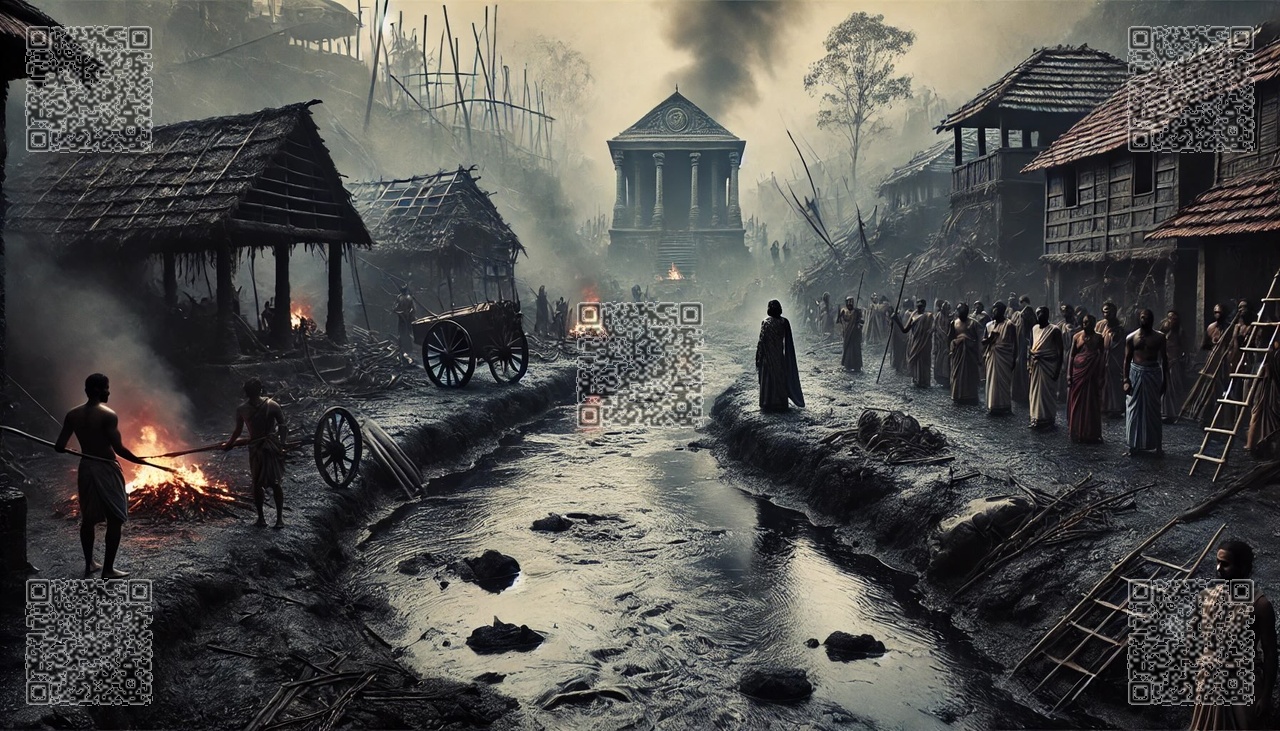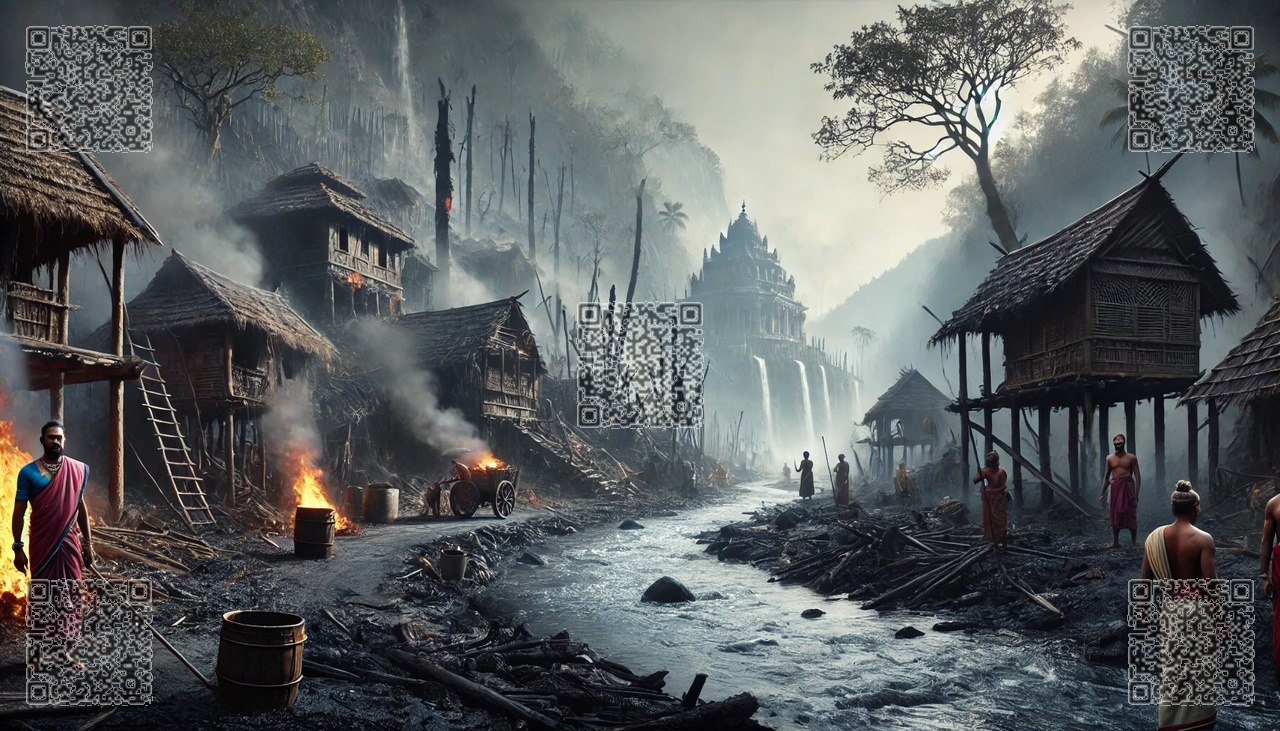The Alummoottil family estate, sprawling and intimidating, stood as a symbol of power in the Karthikappally region off Alappuzha. Beneath its high, sloping roofs, two generations of chieftains ruled with an iron hand. Narasimhan Channar, the master of covert guerrilla tactics and marma vidya, and Balaraman Channar, the shrewd tactician, were the central figures of authority. Yet, above them loomed an external power—Naduvazhi Thampuran, the feudal lord of the region. Despite his title, Thampuran had relinquished all practical authority to Narasimhan Channar. His complacency was bought with bribes of gold, lavish gifts, and the security provided by the fierce Alummoottil soldiers, trained in the ancient arts of kalari, adimurai, and silambam. Thampuran, content to live in idle luxury, let Narasimhan Channar do as he pleased.
In this fortress of power, rebellion brewed in the unlikeliest of forms—love.
Yashoda, the youngest daughter of the family, had the free spirit of a monsoon wind and the beauty of a blooming jasmine. Her laughter, though rare, echoed like temple bells, and her eyes betrayed a fire that even the chieftains feared to extinguish. It was during one such monsoon, amidst the rhythmic drumbeat of rain, that Yashoda’s heart found its rhythm in Vaariar, the humble son of the village priest.
Vaariar was everything the Alummoottil chieftains despised: common, poor, and unassuming. Yet his eyes held a quiet determination, and his voice—low and steady—spoke of dreams untainted by power. The pair met secretly by the banyan tree near the Karipuzha stream, their whispered promises carried by the gentle flow of the water. But whispers, like secrets, do not remain hidden for long in a village.
The storm came in the form of Narasimhan Channar himself. Broad-shouldered and exuding an aura of calculated menace, he summoned Yashoda to the estate’s grand hall. Flames crackled in the hearth, casting jagged shadows on the wooden walls as the chieftain paced before her.
“You dare disgrace this family?” Narasimhan thundered, his voice shaking the room.

Yashoda, her head held high, replied, “I disgrace nothing. I love him.”
Balaraman Channar, seated in the corner with a sly smile, leaned forward. “Love is a luxury we do not afford outsiders,” he said, his tone dripping with disdain. “You will end this madness.”
But Yashoda’s resolve was unyielding. “I will not.”
The chieftains’ verdict was swift. Yashoda was confined to her chambers, her every movement watched. Yet love, like water, finds a way. One moonless night, with the help of sympathetic servants and the cover of darkness, Yashoda and Vaariar fled. Their destination: the distant hills where no chieftain’s wrath could reach them.

The news of their escape reached Narasimhan Channar by dawn. He erupted in fury, rallying his men to pursue the couple. “No one defies Alummoottil and lives to tell the tale,” he bellowed. Balaraman Channar, the strategist, advised patience, but Narasimhan’s pride demanded immediate action.
Using his expertise in guerrilla tactics, Narasimhan planned a swift operation. His soldiers moved silently, blending with the dense forest as they tracked the couple. By the Karipuzha stream, they set a covert trap, using their knowledge of the terrain to isolate and corner Vaariar and Yashoda.
When the couple was found, Vaariar stood protectively before Yashoda, his fists clenched, his eyes fearless. “We’ve done no wrong,” he said. “Let us go.”
Narasimhan’s laughter was devoid of mirth. “No wrong? You insult the very bloodline of Alummoottil. For that, you shall pay.”
Despite Yashoda’s pleas, Vaariar was subdued with precision strikes to his marma points, rendering him unable to resist. Yashoda’s screams echoed through the forest as she was dragged back to the estate, her spirit broken but her heart still defiant.

But Narasimhan’s vengeance did not end there. That night, under the cover of darkness, he led his men to the village. Armed with torches and their deadly training, they moved like shadows, setting fire to every hut, granary, and temple. The villagers, caught unaware, could only watch as their lives went up in flames. Vaariar’s family, his neighbors, his world—all reduced to ash.
From his palace, Naduvazhi Thampuran watched the orange glow on the horizon. One of his aides muttered nervously, “My lord, should we not intervene?”
Thampuran shook his head, sipping from a jeweled goblet. “Narasimhan ensures my lands remain secure. Why should I expend my forces?” His voice was cold and detached. “Besides, a few ashes in a stream do not concern me.”
By dawn, nothing remained of the village but smoldering embers. The Karipuzha stream, once clear, now ran black with ash, earning its cursed name: Kari (black) Puzha (river). The villagers who survived fled, cursing the Alummoottil chieftains and their unrelenting cruelty.
In the days that followed, Yashoda fell into a deep despair. She refused food and water, her once-fiery eyes dulled by sorrow. Her laughter, once vibrant, was never heard again. Within weeks, she succumbed to her heartbreak. Her body was cremated near the Karipuzha stream, and her ashes were consigned to its dark waters.
But Yashoda’s spirit did not rest. The villagers whispered of her haunting presence along the Karipuzha. Members of the Alummoottil family soon discovered that they could not cross the river without calamity. Once, a ferry carrying a prominent family member capsized in its waters, resulting in a tragic drowning. On another occasion, a horse-drawn carriage carrying taxes to the royal treasury broke a wheel on a bridge across Karipuzha. The delay allowed bandits to raid the carriage, stealing the treasury’s contents.

For over a century, the Alummoottil family avoided crossing Karipuzha by ferry or bridge. Instead, they made the arduous journey around the Kayamkulam lake, to which Karipuzha emptied, circumventing the cursed stream. Despite their precautions, the haunting of Yashoda cast a long shadow over the family’s fortunes.
The curse persisted until the family finally resolved to atone. Narasimhan’s descendants rebuilt the village they had destroyed, house by house. They sought out every surviving villager or their descendants, offering reparations and performing penance rituals for each family. Grand pujas were conducted at the Karipuzha banks, and the family commissioned a temple dedicated to Yashoda’s spirit, seeking her forgiveness.

When the temple’s first lamp was lit, the dark waters of Karipuzha began to clear. Villagers reported that the cries and shadows by the river ceased, and the Alummoottil family’s misfortunes lifted. Yet, the tale of Karipuzha remained a stark reminder—arrogance and cruelty leave scars not only on those they harm but also on the generations that follow.
The lesson was clear: power wielded without compassion carries a price that echoes through time.



